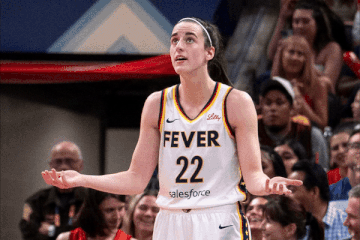The WNBA’s Concern about Caitlin Clark: Is She Too Quiet?

The WNBA game on Friday between the Indiana Fever and Atlanta Dream was a sellout, with standing-room-only seats opened hours before to accommodate fans.
The previous Sunday’s game between the Fever and Sky, showcasing the rivalry between Caitlin Clark and Angel Reese, attracted an average of 2.25 million views — making it the highest rated WNBA game in 23 years.
This success proves that the WNBA is now a major player in the sports world, with growing fan base, media attention, and social media engagement. This shows the league’s diversity and appeal.
Not everyone is pleased, though.
As the WNBA continues to rise in popularity, it has become clear why the league faced challenges in the past: a narrow culture, supported by players, long-time fans, and the media, that prioritizes progressive politics over basketball.
These gatekeepers only want one type of basketball — the activist kind.
“Unfortunately for y’all new fans, we do not just ‘shut up and dribble’ here. Ya picked the wrong league,” tweeted Connecticut Sun guard DiJonai Carrington earlier this week. Carrington, who previously mocked Caitlin Clark for flopping, has actively engaged in off-court drama.
Subria Whitaker, who runs a nonprofit called “Grow the Game,” expressed a similar sentiment, criticizing men who lack firsthand knowledge of intersectionality and other factors in women’s sports discussions.
Intersectionality is a divisive concept that goes against the principles of humanity and meritocracy, but it is ingrained in the WNBA and other women’s pro leagues.
Those who do not conform to this ideology may feel unwelcome.
How can the league expand and attract more viewers and higher salaries when it demands ideological conformity from fans and the media? It’s a delicate balance.
What the WNBA gatekeepers fail to realize is that many people are drawn to Caitlin Clark because she chooses to focus on basketball and avoids getting involved in off-court controversies.
Clark’s consistency in staying above the drama has made her a standout in the league. Despite facing criticism for her race and fans, she has chosen not to engage in negativity.
Even when faced with adversity, Clark has remained respectful and focused on her game, without feeding into off-court provocations.
During an interview before a game, Clark emphasized that her main focus is playing basketball, not getting involved in cultural or political debates. This attitude has attracted both praise and criticism.
Clark’s identity is as a dedicated basketball player who prefers to keep her focus on the game rather than engaging in controversial discussions off the court.
Her unique playing style has brought significant growth to the WNBA and shed light on other talented players. Do we really need her to get involved in managing controversies too?
If basketball must be identity-driven, then let’s respect Clark’s identity as a no-nonsense, on-court player.



